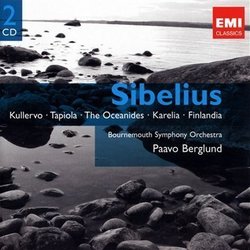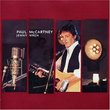| All Artists: Paavo Berglund Title: Sibelius: Kullervo Members Wishing: 1 Total Copies: 0 Label: EMI Classics Original Release Date: 1/1/2008 Re-Release Date: 11/11/2008 Genre: Classical Styles: Forms & Genres, Concertos, Theatrical, Incidental & Program Music, Instruments, Strings, Symphonies Number of Discs: 2 SwapaCD Credits: 2 UPCs: 400000012346, 5099921767425 |
Search - Paavo Berglund :: Sibelius: Kullervo
 | Paavo Berglund Sibelius: Kullervo Genre: Classical
The Gemini Series features an impressive roster of singers, conductors, soloists, and ensembles of international renown, all from the incomparable EMI Classics stable. EMI's rich legacy of recording expertise comes to the ... more » |
Larger Image |
CD DetailsSynopsis
Album Description The Gemini Series features an impressive roster of singers, conductors, soloists, and ensembles of international renown, all from the incomparable EMI Classics stable. EMI's rich legacy of recording expertise comes to the fore in performances from the 1960s to the 1990s. Gemini titles are predominantly collections of single composers and fantastic value with well over an hour of music on each CD, making them the ideal place to start or develop a collection of classical music. Each 2-CD set contains over two hours of music for a fantastically low price. Attractively designed and packaged in space-saving brilliant boxes, each set includes three-language booklets with detailed notes on the music. This release of 10 new Gemini titles will bring the total number of titles in the series to 175. As with previous Gemini releases, this instalment includes many recordings new to CD and as well as recordings that have been transferred from Double Forte. Among the excellent releases in this new set are performances by Plácido Domingo, Natalie Dessay, Deborah Voigt, Janet Baker, Jean-Philippe Collard, Simon Rattle, Michel Plasson, Claudio Abbado, and others! These titles have been digitally remastered to the highest standards at the world famous Abbey Road Studios. Similar CDs
|
CD ReviewsBerglund's 1970 Kullervo: raw, bracing, vital Jasper S | Speckled Mtn., ME | 04/22/2009 (5 out of 5 stars) "This is the first-ever recording of Kullervo, made by Paavo Berglund, the Bournemouth Symphony, and the Helsinki University Male Choir (the "HL" choir) in November of 1970. Sibelius banned its performance during his lifetime. It was never heard in entirety between its 1892 premiere and 1958, the year after the composer's death. Berglund already had a reputation as a Sibelius scholar when he took over the Bournemouth Symphony. That this was his first commercial Sibelius recording with Bournemouth (and EMI) says something about his enthusiasm for blowing the dust of this great work and rehabilitating its place in the composer's canon.
This performance conveys a sense of authoritative control befitting his scholarship. But its chief merit is that the performers avoid delivering a dissertation on Sibelius's early compositional technique, his incorporation of folk myth and songs from the Kalevela, or his creative debts to Bruckner or Rimsky-Korsakov - all interesting subjects, no doubt, but potentially deadening in performance. Though still rigorously controlled, the performance is instead dominated by enthusiasm, passion, and drive; pathos, even. Granted, no one will claim that the Bournemouth forces were among the world's best symphony orchestras in 1970. The playing is sometimes not refined, but it hardly matters. It might even be a strength, since the rasping brass and surging strings add to the impression of a gritty, raw, vital interpretation, to which the programmatic content is ideally suited. In terms of rival recordings, I am no authority. The Gramophone appears to prefer Berglund's Helsinki Philharmonic remake (recorded 1985, last issued in 1994) to this one, though acknowledging the merits of the earlier version. Classics Today lists at least six recordings, including this one, as references. Among those - and also praised by the Gramophone's reviewer - is Sir Colin Davis' LSO live version (2006). This is the only other I am presently familiar with. Though the Davis has all the benefits of modern digital recording and a top-flight orchestra, I prefer the 1970 Berglund. My initial interest in this work was the contribution of the male choir, and I find them much better recorded - balanced, especially - in the Berglund. The singing has an intangible authenticity that the LSO chorus, though good, does not match. The HL choir simply compels you to listen. The soloists, however, are probably better in the LSO version, especially the soprano, Monica Groop. In terms of shaping the orchestral contribution, Davis is undeniably good, but I find his presentation wanting in spontaneity and fervor. It is almost as though he tries too hard to create tension, with the result rigid and restrained. Berglund's actually feels much tenser, and with a raw, almost wild edge, too. It's as though the Bournemouth performers are on the edge of their seats, eager to present what happens next, while Davis' LSO is just putting on another quality, professional concert without any particular commitment to this work as compared to any other. With Berglund and the BSO it's much easier to feel the cold, unforgiving environment of Karelia under your feet and the struggles of its people in your blood as the narrative unfolds. With Davis, you feel like you are watching an IMAX movie about Karelia lore, expertly produced by a visiting BBC film crew, from the comfort of your plush stadium seating. It's plenty good and certainly worthwhile, but it just doesn't communicate as directly as Berglund's does. The 1970 analogue recording is warm, resonant, and surprisingly well detailed in comparison to the LSO (I have read, but do not fully understand, many criticisms of the acoustical properties of the LSO's venue, the Barbican). This is especially true in subtle, piano passages for the orchestra, such as the opening to Kullervo's Death. At the same loudness levels, the LSO is somewhat muddy and hardly audible; the hushed string and woodwind entries of the Bournemouth are nicely detailed. The opening lines of the chorus here are similarly well captured in the Berglund relative to the Davis, and it really bolsters the sense of a tragic narrative if you can trace the line all the way from these murmured beginnings to the heights of the funeral march oration at the end of the movement. None of the works on the second disk are absolutely essential. Each has been done just as well or better somewhere else, including by Berglund himself with the Helsinki Philharmonic in the case of Finlandia, Tapiola, and especially Oceanides (a great version of this elusive composition). But all are good, enjoyable performances and certainly a welcome addition given the offering price. In short: A can't-miss Kullervo with a generous helping of bonus material. Highly recommended. " |

 Track Listings (5) - Disc #1
Track Listings (5) - Disc #1


